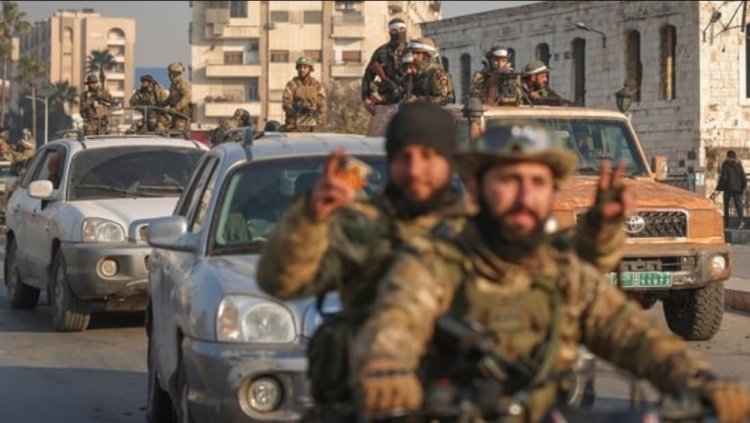Syria, the coup and the gas game
The real fight in Syria was over Qatar's gas pipeline, in which the US and Russia wanted to serve their interests. Assad rejected Qatar's gas pipeline proposal in 2010 because he wanted to protect Russia's commercial interests. This was the beginning of his end.

Syria, Bashar al-Assad's regime has collapsed in Riyadh and the ousted ruler has fled. After not getting permission to land in Lebanon, his plane took a U-turn and headed towards the Russian base Tartus and since then it has disappeared from commercial radar. There is also a possibility that he may have been shot down by an American missile provided by Turkiye. His family had gone to Russia a few days ago.
In fact, rebels led by the jihadist group Hayat Tahrir al-Sham (HTS) launched a major conflict in late November and after capturing several major cities including Syria's largest city Aleppo, captured the capital Damascus on December 8. Army officers fled to Iraq, which was once their biggest friend under dictator Saddam Hussein. America's newly elected President Donald Trump said in this matter that Syria is not our friend and we have nothing to do with whatever is happening there, because this is not our fight. Jabhat al-Nusra, which was once associated with al-Qaeda and is known as Hayat Tahrir al-Sham, first launched a massive attack in the Idlib province adjacent to Turkey. After this, it captured Aleppo and attacked the capital Damascus within 72 hours. A rebel leader has revealed that they were taking training in Turkey for this for the last five years.
The Syrian government's biggest allies were Iran, Russia and the Lebanese militia Hezbollah, while the rebels received political and military support from the US, Turkey, Saudi Arabia, Qatar, Britain, France, Israel and the Netherlands. Abu Mohammad al-Jolani, the wily leader of Tahrir al-Sham, said in an interview with CNN that we were tasked with overthrowing Bashar al-Assad and that was our goal. Al-Jolani is a hardline Islamist who fought against the US in Iraq
He fought for al-Qaeda and in 2018 the US declared HTS a foreign terrorist organization and put a bounty of $10 million on it. Al-Jolani said that the Iranians took time to revive the regime and Russia tried to advance it. Russia's four most secure military bases are in Syria. A large part of Syria was under the control of US-backed Kurdish fighters and Turkish-backed Sunni factions and the US was controlling eastern Syria. Israel carried out air strikes only when it felt necessary. This defeated IS, but it continued to carry out attacks in a stealthy manner.
The question is why did the civil war start in Syria in 2011-2012? Actually, it is all about gas. America and its allies have been trying to take Qatar's gas through a pipeline to Europe via Turkey, Saudi Arabia, Jordan and Syria, so that Europe's dependence on Russian natural gas ends, especially during winter. Russia and its allies wanted to build a 5,600 kilometer pipeline through Iran-Iraq-Syria, which would strengthen Russia's allies as well as boost the Iranian economy. The real reason behind the current conflict is the pipeline.
Bashar al-Assad rejected Qatar's offer of a $2 billion gas pipeline in 2010. He wanted to protect Russia's commercial gas interests in Europe. Leaked documents in 2019 reveal that the CIA used the US to incite civil war in Syria.
The Arab Spring funded the Islamic State and pressured Bashar al-Assad to resign so that a pro-American man could be installed as president and deals to their liking. Thus, the so-called Arab Spring (revolt against governments) swept the region in 2011, overthrowing dictators in Tunisia, Egypt and Libya, and massive protests broke out in Yemen, Bahrain and Syria over issues such as inflation, nepotism, unemployment and corruption. Rebel groups such as the Free Syrian Army were backed by the West and Turkish intelligence agencies. Syria's allies Iran, Lebanon's Hezbollah and Russia came to its defence.
The West was completely with the rebels because they did not like Bashar. Hillary Clinton, who was the US Secretary of State during Barack Obama's time, had declared in 2012 that Bashar was now a president for a few days. Clinton had said after attending a conference of Friends of the Syrian People in Istanbul, "Assad must go." But in 2015, Russia saved his power. Russia bombed the rebels this time too, but they kept moving forward, which reminded of the Islamic State (IS) march of 2014. In 2017, the Emir of the Islamic Caliphate, Abu Bakr al-Baghdadi, blew himself up. Israel has repeatedly attacked Hezbollah and Iranian forces in western Syria. In August 2016, Turkey carried out multi-pronged attacks on northern Syria. In October 2019, Donald Trump immediately withdrew US troops from north-eastern Syria after the elimination of al-Baghdadi but warned Turkey not to take advantage of his decision or else it would destroy Turkey's economy.
The Syrian conflict killed more than one million people, making it the second deadliest conflict of the 21st century after the Second Congo War. In response to the Ankara bombing in late 2023, the Turkish army launched air and ground attacks in northeastern Syria targeting the Syrian Democratic Army. However, it is also true that social and economic inequality had increased significantly since Bashar accelerated free market policies. These policies benefited the country's minority population, which was allied with the government. The country was facing high youth unemployment. So something had to happen. The result was what you are seeing.













